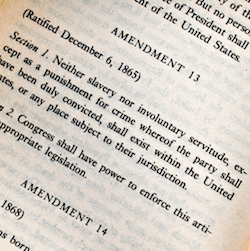After 148 years, Mississippi has “officially” abolished slavery by ratifying the 13th amendment. We can assume that what took policymakers so long was the historical and present-day desire to make sure white privlege was so ingrained that formal slavery was no longer needed, Mississippi policy makers, the moneyed elite and- at the time- the vast majority of its minority white population were all in agreement on how to proceed on this important task. The historic sequence of outright terror and new systems of servitude launched against the Black population included mass killings, lynchings, rape, sharecropping, prison labor and forced flight that decreased the majority Black population of Mississippi to a minority. This all sufficed to ratify a political economy of white dominance that was well in place through the 1950s and 60s. Even after the civil rights and black power movements killed off the last of de jure segregation in Mississippi, a new consensual de facto supremacist system still rules. This system is embraced by far too many people in Mississippi’s now majority white population and by its policy makers, moneyed white leaders. It is even quietly endorsed by the Magnolia State’s new Black elite.
ne example of this ongoing segregation is the prison system. Mass incarceration was created to ensure continued peonage for Mississippi plantation owners. It has continued today where Mississippi now has the second highest incarceration rate in the country, with over 75% of those imprisoned being black and still providing cheap labor. An added benefit – of course – is that after having to give up on poll taxes and grandfather clauses to suppress voting rights, the state is still successfully disenfranchising 14% of its Black population from voting through felony disenfranchisement laws. This is done without much of a stir from elected Black politicians who don’t want to look soft on crime and from Black elites who actual enjoy having access to free labor for their own events.
Poverty has also been ratified in Mississippi as a major national study ranked Mississippi lowest in overall human development and among the four states with the largest disparities between whites and blacks.The study found that black Mississippians, who make up close to 40% of the population, are worse off than blacks in most other states in the nation, ranking second to last on the health and income index (just ahead of Louisiana) and last in education. A black male born in Mississippi in 2010 can expect a shorter life span than the average American in 1960. The ranges of earnings for whites are nearly double that of blacks. But no movement has emerged to shift resources to the Black community.
In the capital city of Jackson, a majority Black city, these race and class disparities are painfully evident. Blacks make up approximately 75% of the city’s population but are 90% of its poor. On average, black families in Jackson earn 40% less in annual income than whites. The black unemployment rate is double the rate of whites, and the recent economic downturn has left many once thriving black families with very little disposable income.
The city itself has been led by Black mayors since 1997, and the state is 40% Black. However, the entrenched conservative policies of the state benefit developers, business elites and state workers who may work in Jackson but who live outside of it. The recently constituted black elite – which includes elected officials, ministers, non-profit and community “leaders” – offer no effective progressive or militant counter-weight to organized conservative policies. Insider conversations seem to be the tactic of the day. The fight for worker rights, for criminal justice system reforms or for redirection of public spending on infrastructure is fought more by lobbying efforts than by building a critical mass of people to challenge conservative orthodoxy. Mississippi lawmakers and the privileged elite in 1865 could not have hoped for a better result. Officially ratified or not, the 13th Amendment has not shown itself to be stronger than the power of white supremacy.
